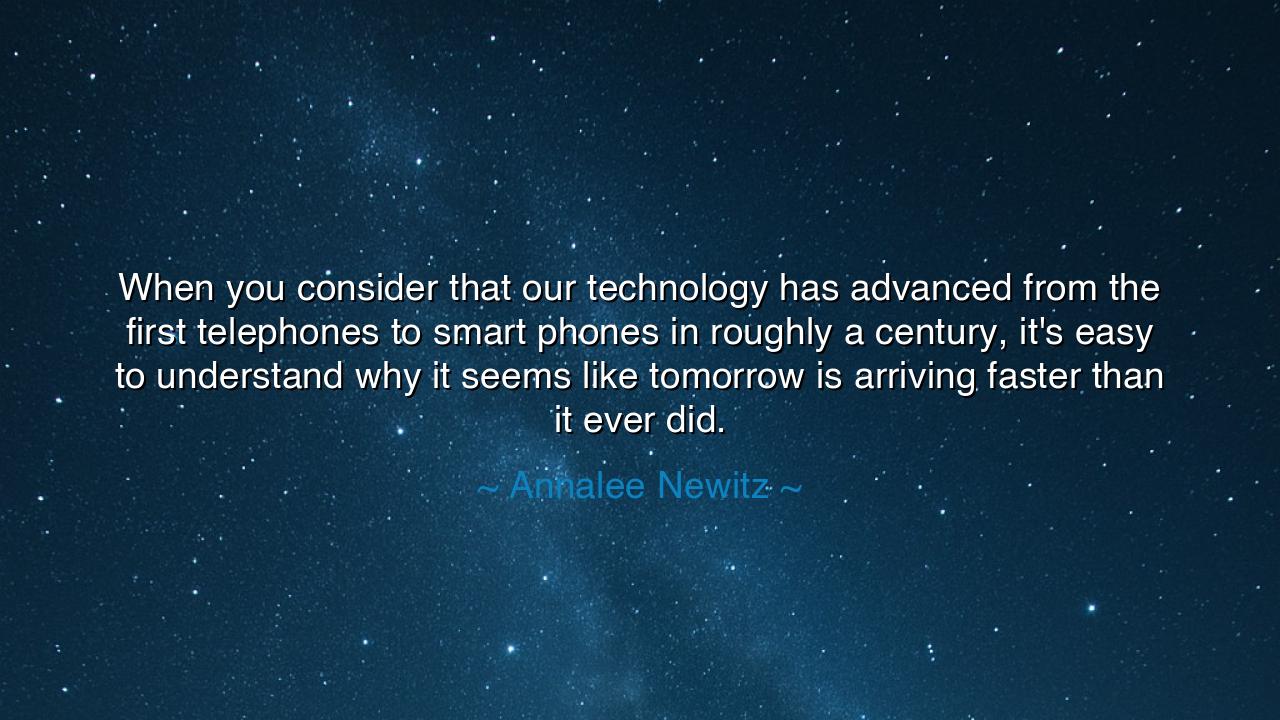
When you consider that our technology has advanced from the
When you consider that our technology has advanced from the first telephones to smart phones in roughly a century, it's easy to understand why it seems like tomorrow is arriving faster than it ever did.






Annalee Newitz, a thinker of modern progress, once declared: “When you consider that our technology has advanced from the first telephones to smart phones in roughly a century, it’s easy to understand why it seems like tomorrow is arriving faster than it ever did.” These words are not merely about machines but about the human experience of time itself. They remind us that when change accelerates, the future does not wait politely at the horizon—it rushes toward us, pressing upon our present, demanding that we adapt more quickly than our ancestors ever imagined.
The ancients knew a slower rhythm. For them, centuries might pass before a single tool changed the way of life. The plow, the wheel, the sail—these marvels endured for ages with little alteration. But in our era, what was once a miracle yesterday becomes obsolete today. The telephone, once a wonder that let voices travel across distance, is now seen as crude compared to the smart phone, which not only carries voices but knowledge, maps, images, and a world of connection in the palm of one’s hand. Newitz reminds us that the pace of change has grown so swift that the march of tomorrow feels more like a sprint than a journey.
Consider the example of flight. In 1903, the Wright brothers barely lifted their fragile craft into the air. Sixty-six years later, in 1969, humanity stood upon the Moon. What had once been the stuff of myth and poetry became reality in less than a human lifetime. If the ancients dreamed in slow centuries, the modern age dreams in decades. This is why, as Newitz says, it feels as if tomorrow is always pressing into today—as if the future is impatient, unwilling to wait.
But this acceleration is not without consequence. With each leap forward, societies struggle to adapt. The rise of the smart phone brought unprecedented connection, yet also loneliness, distraction, and the collapse of old ways of speaking and remembering. The wheel of progress turns faster, but it can crush as easily as it can lift. Thus, Newitz’s words are not merely wonder—they are also a caution: when technology races ahead, the human heart must learn how to keep pace without losing itself.
History offers us a warning in the Industrial Revolution. Machines multiplied production, wealth, and cities—but they also brought child labor, smoke-filled skies, and the alienation of workers from their craft. The people of that age too must have felt tomorrow arriving too quickly, as old rhythms of farming life vanished almost overnight. Yet from the chaos came reform, adaptation, and new ways of being. So it is with us: each advance forces us to ask not only what can we do, but how shall we live with what we have made?
Newitz’s reflection points also to the paradox of wonder and fear. To live in an age where tomorrow comes swiftly is to live in both exhilaration and anxiety. It is to marvel at cures for diseases once fatal, but to fear the rise of tools that may outstrip our wisdom. The speed of change fills us with possibility, yet also with dread of what we may lose. The ancients warned that hubris—the arrogance of rushing ahead without reflection—leads to downfall. Thus, as we embrace our swiftly arriving tomorrows, we must also anchor ourselves in wisdom, patience, and humility.
So, dear listener, let this teaching rest upon your heart: rejoice in the gifts of technology, but do not be consumed by their pace. Understand that tomorrow will always arrive faster than yesterday prepared us for—but it is in our power to greet it with discernment. Learn from history: marvel at progress, but guard the soul. Use the smart phone, but also listen to the silence. Welcome the future, but do not abandon the wisdom of the past. For in the end, the speed of tomorrow matters less than the steadiness of the heart that receives it.






AAdministratorAdministrator
Welcome, honored guests. Please leave a comment, we will respond soon